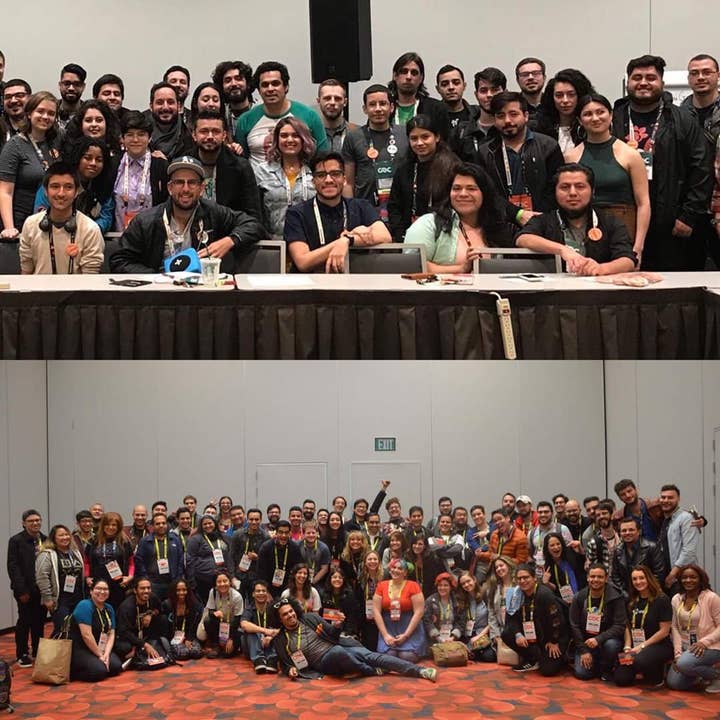Latinx in Gaming takes over PAX South
Latinx organization to host a weekend's worth of panels, events, keynotes, and gatherings to celebrate the Latinx games community
Latinx in Gaming co-founders Cristina Amaya, Judy Barbosa, and Joe Tirado are preparing for their organization's biggest event yet: a full weekend of Latinx-focused programming at PAX South in January. And they want to welcome anyone and everyone who is interested.
"Latinx in Gaming is, at its core, a way to bring people together that are either interested in or descended from Latinx origins, and who are specifically interested in either telling those stories or getting advice from people who have had very distinct experiences in the industry," says Barbosa. "It's a space for us to gather online and offline."
Latinx in Gaming kicked off at GDC 2018, when the three aforementioned co-founders, as well as fellow co-founders Elaine Gomez and Juan Vaca, hosted a roundtable in partnership with the IGDA. Since then, the group has held panels and roundtables at numerous other industry events, and its community continues to grow. Because while there are other groups dedicated to Latinx outreach that have done similar activities at industry events, Latinx in Gaming is one of the few that isn't tied to a particular company.
"As we've grown, we've realized that we want this to be a place for people to gather not directly tied to any organization; we want it to be our own thing," says Amaya. "Latinx in Gaming at Microsoft is a really fantastic group, but it's mostly an internal resource for employees. I know Facebook has one, I know Google has one, so there are these big groups. but they're focused around creating a Latinx experience within that company. What we noticed was that there was no real group that did that just in gaming as a space that was agnostic."
"There are so many stories within the Latinx community that are unique to different areas or different dialects or different regions"
Joe Tirado
The response has been positive from all different subsets of the gaming community, from developers to publishers to streamers to people who simply play games. Tirado adds that the enthusiasm has even gone beyond the Latinx community, as Latinx in Gaming is happy to welcome people who are just there to learn.
"Whenever you do something like this that involves a smaller subset of people you sort of temper your expectations, but we were actually blown away by the amount of people that showed up [to the first GDC event]," he says. "And the amount of people who showed up who weren't in the Latinx community but maybe wanted to learn more about it.
"I think it was pretty energizing for all of us to see that happen and realize there is a humongous need for this from many different angles. There are so many different stories within the Latinx community that are unique to different areas or different dialects or different geographical regions. It was both really exciting but also kind of daunting to see there were so many different problems to start working on."
Barbosa adds: "All we needed to do was establish the platform. We just needed to say, 'We'll protect this space, tell us what you're thinking and how you feel.' We got a wealth of different experiences from people in different parts of South America, people who grew up in the US and had identity conflicts between their different cultural heritages, even people who had no biological connection but had a circumstantial one or an environmental one. Seeing the influence of that pervading across the board is interesting."

Amaya highlights the importance of such platforms for minority communities in the industry, adding that the group's roadmap started with the simple message, "You belong here."
"There are people within the Latinx community even adjacent to us that don't feel they belong in the space, and there are a variety of reasons for that," she says. "A major one is that Latinx is so diverse and there are so many different people that fall under that umbrella that they're not sure how to fit into it. We're trying to tell them they can be a part of this space."
Tirado notes that there are some problems that seem to be common across all the different communities that make up Latinx in Gaming. One, he says, is the cost-prohibitive nature of industry events like GDC. Another is the language barrier.
"There are people within the Latinx community even adjacent to us that don't feel they belong in the space, and there are a variety of reasons for that"
Cristina Amaya
"GDC and other industry events like it are almost always presented in English," he says. "For a large part of the Latinx community that is overseas and can't get here, even if they wanted to watch something later, it's in English and isn't translated. Some of the ways we're looking at that and some of the stuff we're hoping to do even at PAX South is having things presented in both languages, or presented fully in Spanish, and having it feel more inclusive for certain people."
Latinx in Gaming's programming has diversified considerably beyond its panel roots over the last year or so. Barbosa says that they have partnered with other organizations (such as Microsoft) for some activities, or hosted their own, and have run events such as a 24-hour stream of Latinx streamers, charity streams of games by South American developers, and volunteering with Texas-based non-profit Latinitas. But their bread-and-butter, as Barbosa puts it, is conventions, because they allow for a very public space where Latinx community members looking for industry opportunities can connect.
"It made sense for us for the first year and change to do more outreach," Tirado adds. "The launch of anything requires some time to get out there, make sure people know you're there, make sure people know you're serious, and doing this thing with PAX and Reed at PAX South is the natural progression of, 'Hey, we are serious, and people do want this resource and to hear about this kind of content.' And instead of one panel, we're doing a full weekend of programs for all sorts of different people."
At PAX South, Latinx in Gaming will have a dedicated space for the weekend. None of it is set in stone just yet, but Amaya says that the team has its own ideas and is also looking for submissions from its community.
"As long as they take a positive memory from the experience and are able to connect with somebody, that's the goal"
Judy Barbosa
Barbosa adds that those ideas include things like morning cafecito, roundtables, workshops, keynote speakers, networking opportunities, tournaments, and games. "We're really thinking across the board in trying to involve as many people, exposing them to the Latinx experience as varied and unique and cultural and exciting as it is, as well as drilling down and making things useful for people trying to get into the industry and looking for someone to relate to."
Amaya, Barbosa, and Tirado are tempering their expectations for the weekend. While a large crowd of people attending their programming would be great, they say, each of them has a more personal and community-oriented idea of what success for Latinx in Gaming at PAX South might look like. For Amaya, it's simply making sure people feel included. Barbosa goes a bit further:
"Personal connections are super meaningful," she says. "If someone has a distinct memory they can take away, whether it's as simple as, 'I remember that song from my childhood' or 'Wow, that coffee was really good' or 'I really learned something.' Or maybe someone took a gander at your resume and you were able to edit it to make it more cohesive. As long as they take a positive memory from the experience and are able to connect with somebody, that's the goal."
For Tirado, the event is already a success for Latinx in Gaming simply by virtue of its existence, and he hopes that everyone who is interested will attend, regardless of how strong their connection to the Latinx community might be.
"Everyone is welcome to participate in this thing and their connection to the Latinx community doesn't have to be a secret for them anymore. A lot of people, myself included, have felt that in the past they couldn't stand proudly with that part of their heritage, or maybe it wasn't a big part of their life before. One of the biggest things for us is letting people know they can have this as part of their identity and it's okay, and there are places for you to learn more about that and go out into the world and spread that message."
GamesIndustry.biz parent Gamer Network is owned by Reed Pop, which organises PAX South.

